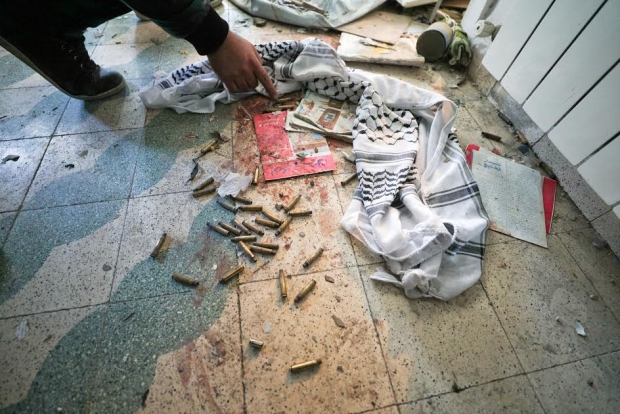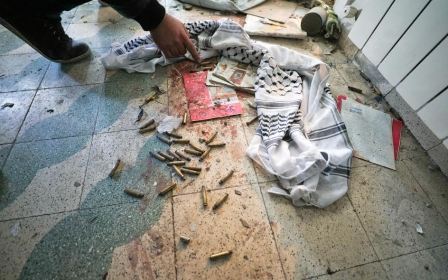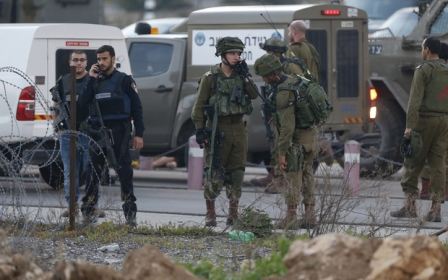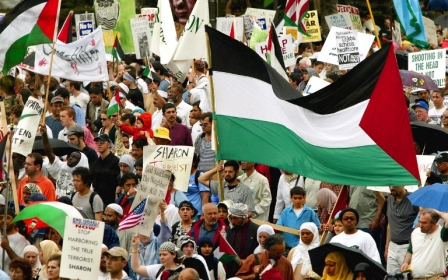Basel al-Araj: Martyr of Palestinian Authority's security coordination with Israel
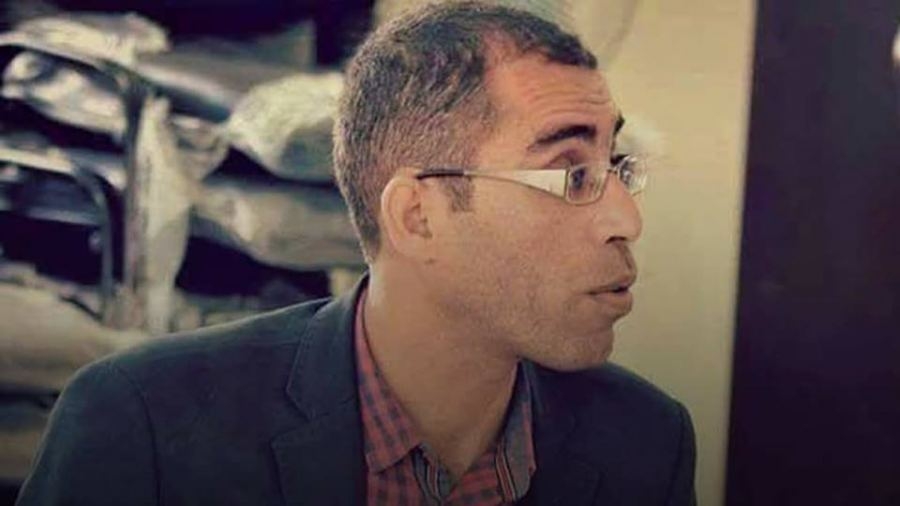
A week ago, the loud streets of Ramallah were interrupted with the sound of youth chanting after the assassination of Basel al-Araj.
Underneath the fervent roar of the crowd was anger, sorrow and indignation, an implosion of resentment toward the powers which continue to oppress and strangle Palestinians.
“The puppets of Oslo aren’t here,” a young woman in the group whimpered.
“They’re still coming after us,” another replied. “They have to protect Israel you know.”
In the early hours of last Monday morning, Israeli soldiers raided the house where Basel was hiding and, after a two-hour armed confrontation, walked out dragging his dead body.
The PA used Basel and the other young men whom they had detained as a symbol of their commitment to security coordination with Israel
What remained was a torpedoed apartment with Basel’s clothes scattered on a destroyed bed, blood-stained tiles and a stack of books on a wrecked wooden stand.
After the Palestinian Authority imprisoned him last year along with two other youths on allegations that they had unlicensed weapons and were planning to attack Israeli targets, Basel was tortured and undertook a hunger strike as the PA prolonged his arrest for months without charges.
The PA used Basel and the other young men whom they had detained as a symbol of their commitment to security coordination with Israel.
It was only several weeks after their release from PA prisons that the same youth were re-arrested by Israeli forces and Basel was forced into hiding, dropping all contact with his family.
History of targeting intellectuals
As Basel’s loved ones try to grapple with this heavy loss, it’s critical to recognise the forces which made his assassination possible.
Basel embodied the Palestinian fighter in his intellect and high-profile presence. To echo his words, 'If you don’t fight, your intellect is pointless'
Basel embodied the Palestinian fighter in his intellect and high-profile presence on the ground. To echo his words, “If you don’t fight, your intellect is pointless.”
It is intellects like Basel’s which inspires Israeli fear not simply in and of itself, but the potential it creates to mobilise others toward efforts to end the occupation.
Israel has translated its fear in a longstanding history of targeting and assassinating politically motivated Palestinian intellectuals, from Ghassan Kanafani to Kamal Nasser. It's an attempt to kill Palestinian consciousness and desire for liberation.
The role that the PA plays in suppressing Palestinian voices for the sake of appeasing Israeli colonialism is not something missed by Palestinians. Most recently, they marked their discontent by mobilising on Sunday to protest in front of the judicial court in Ramallah – and were met with gas bombs, beatings and violence.
Amid the chaos, in an appeal to stop police from forcibly beating Basel's father, a young woman screamed: “He is the martyr’s father.”
Mahmoud al-Araj was eventually taken into the hospital after sustaining injuries. The PA arrested four other men, including notable hunger striker Khader Adnan.
Oh martyr, go on and rest
Sunday’s protest – and the PA’s reaction - exposed once again the lengths to which the PA will go to preserve its relationship with Israel and keep itself in power, even if it means enforcing the same repressive strategy familiarised for Palestinians by Israeli forces.
In the past, when the Palestinian population would grieve the assassination of their martyrs and leaders, including intellectuals, it was customary to chant: “Oh martyr, go on and rest, we will continue the struggle.”
The role that the PA plays in suppressing Palestinian voices for the sake of appeasing Israeli colonialism is not something missed by Palestinians
Prior to the hijacking of the first intifada by the Oslo Accords, the struggle ahead was against a clear Israeli regime of colonialism. Present-day Palestine, however, is fighting a kaleidoscope of colonialism’s multi-faces.
The most distressing of these manifestations is the Palestinian Authority. It was the temporary-turned-permanent interim administration of the Oslo Accords which gave birth to the security coordination Mahmoud Abbas hails as “sacred”.
It is only fitting that Basel is labelled the “martyr of security coordination”. His blood, strewn across the aging tiles of his home, down the stairwell and onto the concrete outside his building in Al-Bireh, is a flagrant display of what Israel can accomplish with security coordination.
Oslo’s Trojan Horse
This strategy is not new, nor exclusive to the Abbas era. Since its inception, Israel has relied on the recruitment of Palestinians as collaborators to counter any Palestinian resistance and mass mobilisation efforts.
Israel gifts the Palestinians with an oppressive authoritarian regime, fed by the promise of power and rule
And Israeli’s gold medal of recruitment, its ultimate collaborator, remains the Palestinian Authority. As a result, Israel not only ensures a sustained source of information, but also gifts the Palestinians with an oppressive authoritarian regime, fed by the promise of power and rule.
Through feeding the PA with the aspirations of leadership and all the commodities which come with it, Oslo and its corollaries were wired to be a Trojan Horse, invited to further divide the struggle.
The disparity between the ambitions of the PA and Palestinians is not a figurative divide. It is, in the most literal sense, a bloody division. Last week, it was Basel. This week, who knows? But the end result will always be the sacrifice of our youth, whether in murder or behind bars.
Fighting the obstacles of oppression
Despite its horrendous crimes at home, to the international community, the PA unrelentingly portrays itself as the legitimate representation for the Palestinian people.
However, with the West Bank and Gaza in conflict, Palestinians in exile or in Israel finding no one to represent their demands, and the growing despotism in the region, the PA has driven the Palestinians down a path of disenchantment, suppression and accentuated division.
After the Sunday beatings endured by protesters, they gathered once more on Monday. The crowd chants in Ramallah and a poster at the demonstration reads, "The only solution is the dissolution of the PA".
Although history teaches us that no anti-colonial struggle was successful without sacrifice and the loss of lives, as a population who knows how to paint grief in a thousand images, we ache to stop mourning the loss of loved ones and to revel in the loss of oppression, which now includes the Palestinian Authority.
- Mariam Barghouti is a Palestinian writer and commentator who hails from Ramallah. Her writing has appeared in the New York Times, Al-Jazeera English, Huffington Post, Middle East Monitor, Mondoweiss, International Business Times and more.
The views expressed in this article belong to the author and do not necessarily reflect the editorial policy of Middle East Eye.
Photo: A photo of Basel al-Araj (Twitter/@_JuanModesto_)
New MEE newsletter: Jerusalem Dispatch
Sign up to get the latest insights and analysis on Israel-Palestine, alongside Turkey Unpacked and other MEE newsletters
Middle East Eye delivers independent and unrivalled coverage and analysis of the Middle East, North Africa and beyond. To learn more about republishing this content and the associated fees, please fill out this form. More about MEE can be found here.



